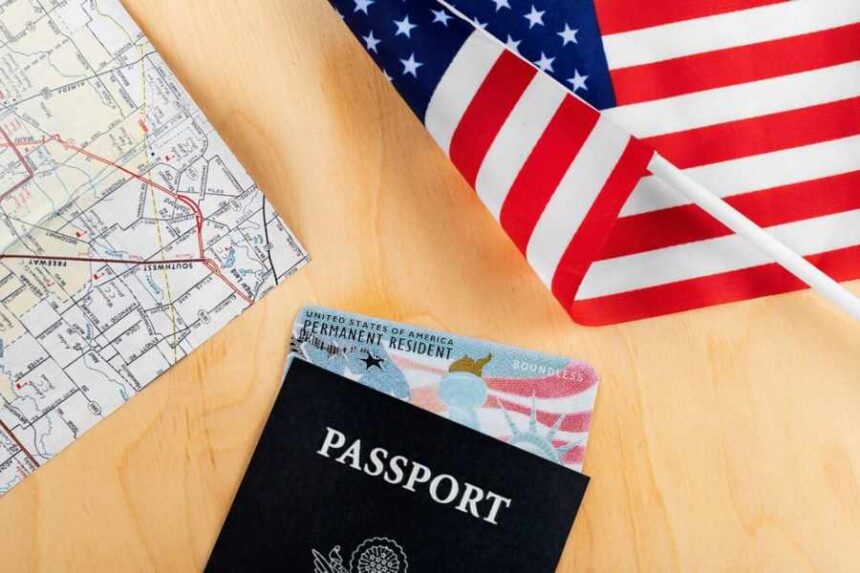Why do you want to be a US citizen? For many immigrants, this question goes beyond legality and touches on identity, opportunity, security, and belonging. Becoming a citizen of the United States is a significant milestone that opens the door to a range of rights, protections, and possibilities. The benefits are symbolic and practical, from voting in federal elections to obtaining a U.S. passport.
- The Personal and Legal Meaning of Becoming a US Citizen
- What Are the Key Benefits of Becoming a U.S. Citizen?
- Legal Rights and Constitutional Protections
- The Right to Vote and Influence Government
- Access to Federal Jobs and Benefits
- Greater Travel Freedom with a U.S. Passport
- Enhanced Family Reunification Opportunities
- Top Reasons People Say ‘Why Do You Want to Be a US Citizen?’
- Challenges You May Face on the Path to Citizenship
- How to Prepare a Strong Citizenship Application
- Know If You Qualify Before You Apply
- Ace the Test: Study Like a Pro
- When in Doubt, Lawyer Up
- Stay Clean and Stay Ready
- Final Thoughts
- FAQ’s
American citizenship represents more than a status—it offers stability, freedom, and full participation in a democratic society. Whether you’re applying through naturalization, marriage, military service, or other pathways, the desire to become a U.S. citizen often stems from personal reasons. Some seek safety and asylum, others want to reunite with family, pursue better jobs, or participate more fully in civic life.
This article provides a comprehensive guide for those asking, “Why do you want to be a US citizen?” We’ll explore legal advantages, emotional and cultural factors, how to navigate the application process, and what citizenship means for you and your family.
Why do you want to be a US citizen?
Because it offers stability, full legal rights, voting access, and better opportunities for my future and my family’s well-being.
The Personal and Legal Meaning of Becoming a US Citizen
For countless immigrants, pursuing U.S. citizenship is more than just a legal transition—it’s a significant and life-changing goal. The desire to live without fear of deportation and to fully participate in American society drives many to take this critical step. Citizenship offers the complete protection of the U.S. Constitution, something that visa holders or green card recipients may not fully enjoy. It also opens the door to civic participation, such as voting in federal and state elections, helping individuals have a voice in the democratic process.
Legal advantages go beyond voting rights. U.S. citizens gain access to exclusive government programs, including Social Security, Medicare, and federal education assistance. Citizenship also provides the ability to sponsor a broader range of family members for immigration and ensures automatic citizenship for children born to U.S. citizens, even abroad. Additionally, traveling with a U.S. passport simplifies international movement and offers support from U.S. embassies worldwide. For digital entrepreneurs managing websites or SEO, knowing how to Buy Quality Backlinks Cheap may help visibility. Still, citizenship provides the ultimate freedom and security to build a lasting future in the U.S.
What Are the Key Benefits of Becoming a U.S. Citizen?
Becoming a U.S. citizen unlocks a wide range of privileges that go far beyond permanent residency. From legal protection to global mobility, the benefits are life-changing.
Legal Rights and Constitutional Protections
One of the most significant benefits of becoming a U.S. citizen is the complete legal protection granted under the U.S. Constitution. Citizens are protected from deportation, enjoy due process rights, and have access to all levels of the U.S. court system. This level of legal security provides a sense of permanence that permanent residents or visa holders do not have.
The Right to Vote and Influence Government
Citizenship grants the right to vote in federal, state, and local elections. This means you can directly influence the country’s political direction, from electing presidents and congressional representatives to participating in local ballot measures. Voting gives citizens a voice in shaping the laws and policies that affect their everyday lives.
Access to Federal Jobs and Benefits
Many government jobs, particularly those in federal agencies, are only open to U.S. citizens. Additionally, citizenship unlocks access to benefits like Social Security, Medicare, and federal educational financial aid. These resources can be vital for long-term stability and personal advancement.
Greater Travel Freedom with a U.S. Passport
A U.S. passport provides visa-free or simplified entry into over 180 countries. It also ensures access to U.S. embassy services abroad, offering critical assistance in emergencies while traveling or living overseas.
Enhanced Family Reunification Opportunities
Citizens can sponsor more family members for immigration than permanent residents. This allows for faster and more flexible family reunification, strengthening support systems and building multigenerational futures in the United States.
Top Reasons People Say ‘Why Do You Want to Be a US Citizen?’
For many immigrants, the question “Why do you want to be a US citizen?” evokes deeply personal and emotional responses. While the legal benefits are significant, the motivations often come from a place of belonging, hope, and aspiration. Here are some of the most common and heartfelt reasons people give:
- Security: Gaining citizenship offers lifelong protection from deportation. It gives immigrants peace of mind, knowing their permanent and secure place in the country.
- Freedom: Citizenship grants full access to free speech, religion, and expression rights—freedoms that may not be guaranteed in their countries of origin.
- Opportunity: Becoming a U.S. citizen opens doors to higher education, healthcare, and improved job prospects. It paves the way for a more stable and prosperous future.
- Identity: Many feel that citizenship affirms their identity as part of the American community, bringing a sense of inclusion and acceptance.
- Family: Citizenship helps keep families together. It allows people to sponsor relatives and secure a stable future for children born or raised in the U.S.
- Participation: Voting in elections and engaging in civic life is a significant milestone. Citizens can shape policies and directly impact their community and country.
Challenges You May Face on the Path to Citizenship
The journey to becoming a U.S. citizen is rewarding but not without its obstacles. Many applicants encounter various challenges that can delay or complicate the process. Below are some of the most common difficulties faced along the path to naturalization:
- Language Barriers: The naturalization process includes an English reading, writing, and speaking test and a civics exam. Without proper preparation, passing these assessments can be daunting for non-native English speakers.
- Application Costs: The financial burden of applying for citizenship can be significant. USCIS filing fees, legal assistance, and potential translation or documentation costs can add up quickly, making it difficult for lower-income applicants to proceed.
- Long Wait Times: Due to high demand and limited processing resources, citizenship applications can take many months—or even years—to review and approve. This waiting period can be stressful and uncertain.
- Documentation Complications: Gathering accurate and complete documentation, including past travel records, tax filings, and proof of residency, is often complex and time-consuming.
- Legal Ineligibility: Certain immigration violations or criminal offenses in your background can make you ineligible for naturalization, even if you meet all other requirements.
How to Prepare a Strong Citizenship Application
Preparing for U.S. citizenship takes more than just filling out a form—it requires planning, accuracy, and readiness. Here’s how to build a strong application from the start.
Know If You Qualify Before You Apply
The first step toward U.S. citizenship is making sure you’re eligible. This means meeting age, residency, and continuous presence requirements. You must also show good moral character and a lawful immigration history. Missing even one requirement can slow your journey or result in a denial.
Ace the Test: Study Like a Pro
Don’t underestimate the civics and English tests. It’s a key part of the process, and preparation is everything. Use USCIS-approved resources, practice with flashcards, and take mock tests online. Knowing what to expect builds your confidence and helps you succeed on test day.
When in Doubt, Lawyer Up
If your case involves complications like past immigration violations or criminal issues, don’t guess—get expert help. A qualified immigration attorney or a nonprofit legal aid group can guide you through tricky requirements and ensure your paperwork is airtight.
Stay Clean and Stay Ready
A clean legal record can make or break your application. Be honest, accurate, and careful with your history. At the same time, gather everything you’ll need—tax returns, green card copies, travel records, and ID documents—well in advance. Organized applicants often move faster through the system and face fewer delays.
Final Thoughts
In the end, reflecting on the question “why do you want to be a US citizen” reveals a significant life choice, not just a legal goal. U.S. citizenship offers more than just paperwork—it grants lasting security, the ability to participate in democracy fully, and the freedom to build a stable life for yourself and your family. Citizenship opens doors that transform futures, from voting in elections to accessing government benefits and reuniting with loved ones. It also brings a strong sense of identity and belonging in a country built on diversity. Though the path may require effort and patience, the reward of becoming a U.S. citizen is a lasting and empowering achievement.
FAQ’s
Can I lose my U.S. citizenship once I get it?
Loss of citizenship is sporadic and typically only happens if you committed fraud during the naturalization process or choose to renounce your citizenship voluntarily.
Do I need to give up my original citizenship?
In most cases, no. The United States allows dual citizenship, but verifying whether your home country permits it is essential, as some nations require renunciation.
How long does it take to become a U.S. citizen?
On average, the naturalization process takes between 6 to 12 months after submitting your application, though it may vary depending on USCIS backlogs and your specific case.
Is the naturalization test hard?
Most applicants pass with proper preparation. The test covers basic English reading and writing skills and civics questions about U.S. history and government.
Do children automatically become citizens?
Children under 18 generally become citizens automatically if at least one parent naturalizes and the child is a lawful permanent resident living in the U.S.




